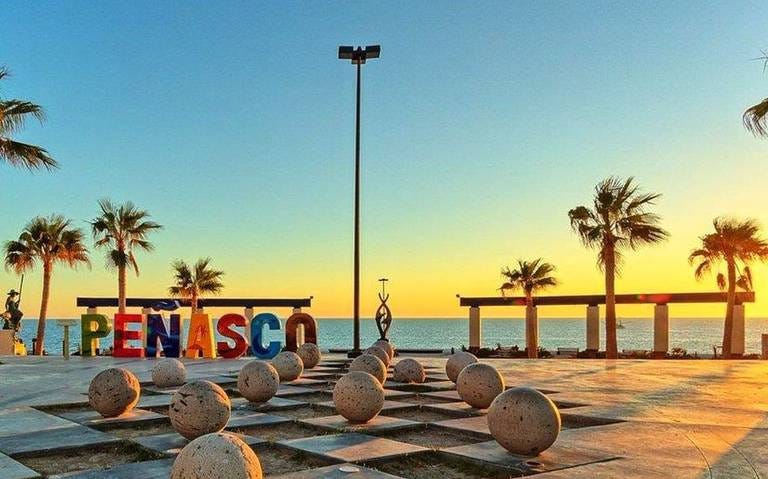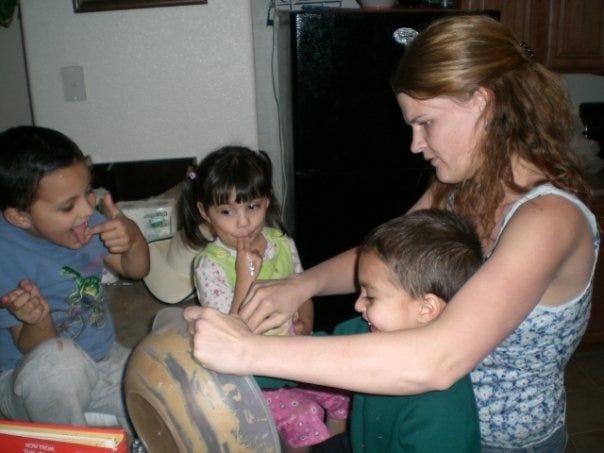I ran away to Mexico a few times as a teenager, each time going with a different set of friends. Living in Phoenix at the time, it wasn't so far out of my way so we’d gather whoever was willing, some sleeping bags, and whatever cash we could pull together, then drive south a few hours until we hit the beaches of Puerto Peñasco—Rocky Point for you kids in the back. I don't know what the rest of the crew told their parents. I didn't bother telling mine anything.
I don’t know what it’s like down there now, but in the ’90s, Mexico was heaven for me. Days were spent wandering the touristy areas of town, generously spending our money on food, clothes, and drinks... nobody ever carded us, and I learned a LOT about tequila, and a bit of conversational Spanish. We avoided the kids selling Chiclets and the ones trying to wash your windshield with a muddy squeegee. I never understood their goal. We’d also walk through church grounds and neighborhoods, marveling at the simple beauty and, in some cases, the pageantry of how faith was displayed in every alcove and niche you could find. The sun was perfect and the sound of the ocean permeated our every step.
At sunset we would head to the beach. We didn’t have enough money for a hotel room and we wouldn’t have wasted it that way if we had, so we set up a tent, lit a fire, and made the best of it. There was an old shell of a large multi-room stone building just off the water that served as a dance club—no roof, just sky, a DJ in the middle, and bikini-clad bodies all around. There were no doors or doormen, so I’d wander in and out, soaking in the pounding music and the press of people. I wasn’t much of a dancer, but the energy was contagious.
I never drank at night there, and I always made sure to have an “exit buddy” with me—safety in numbers and all that jazz. Eventually, we’d wander back to the tent area and talk until sunrise about what we wanted for our future as college kids sped by on ATVs, throwing firecrackers at each other.
Looking back as a “real adult” now, I realize how dangerous it was. Nobody knew where I was, there were no cell phones, and let’s not even start on the threats that must have lurked just out of sight for a teenage girl in that situation. But in those moments, I felt free. I felt like I was part of the real world, not the constant daily stress and tragedy of my home life. For a little while, I was living the life I thought I was supposed to have.
The drive home was always sobering. The windowless hovels and door-less shacks along the return trip that I didn’t notice on the way in were glaringly obvious on the way out. The kids selling candy had no shoes and broken teeth. The border patrol agents were terrifying, and we were always exhausted. The ride back seemed to stretch twice as long as the drive there and, as predictable as the sunrise, nobody asked where I had been when I got home.
I went on those trips because I needed to escape. I didn’t think past that.
Home was a flop house full of selfish, abusive idiots who fought with each other nonstop and neglected the many kids in the house at best. They were all controlled through intimidation and a small amount of charm by my dad. If you weren’t being assaulted, you were being beat, belittled, or otherwise made to feel like the scum of the earth. It was best to just aim for being invisible. At least that’s what I did.
By the time I was 13, I was running away from home. By 15, I had moved out entirely. I ran to the beaches of Mexico, the streets of San Francisco, or the mountains up north—not because I had a plan, but because no one cared where I was anyway, and I didn’t want to be there.
When I was away, I mentally shut out home. I lived as if I wasn’t that girl with all that baggage. It made it harder to go back because every time I returned, much like the drive home from Rocky Point, the flaws and failures of my life felt more glaringly obvious.
Eventually, I just didn’t go back. When I turned 15 a friend of mine left for college, so I rented her room to help out her single mother, got two jobs, and saved every penny I could to buy a house. My only goal was to ensure I’d never have to live with my parents again.
I became a workaholic who clung to every ounce of affection I could get. It wasn’t until years later in therapy that I realized how unhealthy my relationships were. I accepted the bare minimum for myself and went along with things just to keep the peace. Hell, I got married without even being very excited about it... it was just "the next step" according to the people I knew who didn't grow up in hell.
I was stubborn about those relationships, too. They weren’t overtly abusive or dangerous or even neglectful so I rode them out until they fizzed and faded. They just didn’t make me happy, and somehow that felt like my fault. I gave it my all—especially in my marriage—because I didn’t know it was supposed to be better than that. It was the healthiest relationship I’d ever had, but I didn’t know my scale was tilted by my upbringing.
I eventually came to realize the marriage wasn’t good. He was a liar and an extreme narcissist. I tried and tried to bend myself to fit his idea of what married life was supposed to be. When I ended up pregnant I thought having kids would make the marriage better, but instead, it only made ME better. He left me in a very anti-climactic kind of way right after the kids came, and only in hindsight can I admit how relieved I was. I never would have ended it on my own back then.
I very quickly learned that motherhood was the first real love I ever felt. Whatever kind feelings I had for my husband showed themselves for the pale flicker of light they were against that. It was like thinking a light bulb was bright because you’d never seen the sun. Motherhood was basking in the sun on a mid-July day on the beaches of Puerto Peñasco, and I started REALLY living the life I was supposed to have.
Drinking: Blade & Bow, neat.
Listening to: “Drive South” by Suzy Bogguss
A little “like” and a restack go a long way! <3






